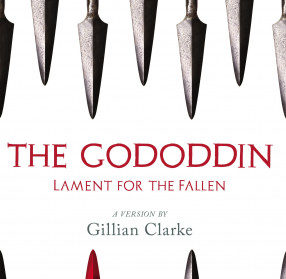Thomas Tyrrell laments the fallen in Gillian Clarke’s new version of The Gododdin, a work which transforms the medieval Welsh epic into a hundred short lyrics.
Men rode to Catraeth, one day towards the close of the sixth century, three hundred cheerful warriors, still part-drunk on mead, gold torcs gleaming at their throats, shields and spears clanking against the flanks of their horses. They were the Gododdin, Mynyddawg’s war band, and among them was Aneurin, the most gifted bard of his generation, a singer at feasts and in the halls of princes. One of the three survivors left after the slaughter unfolded, he lived to praise and lament his fallen comrades in the poem he called The Gododdin. Along with the lyrics in the Black Book of Taliesin, it’s the earliest poem by a named author to survive anywhere in the British Isles.
Three hundred gold-torqued men made war
to defend their land. Blood was shed.
They killed before they died.
They will be praised till the world ends.
Aneurin would doubtless be surprised for how many centuries that final boast has held true, while life in these isles has changed almost beyond recognition. One thing has remained the same: men still ride to Catraeth, or Catterick as it’s now better known. In one of the stranger coincidences of literary history, it’s now the site of the biggest military garrison in the UK. In the meantime, The Gododdin has itself become contested ground, claimed for the cultural history of three emergent nations: as the earliest Welsh poem, on linguistic grounds; as the earliest Scottish poem, in terms of geographical production; and as the earliest British poem, on general sporting principles. What we look for in war poetry has also changed radically, with Wilfred Owen’s evocation of the pity of war and the martyrdom of the unknown soldier replacing the elaborate boasting of valour and the praise of famous warriors.
Gillian Clarke’s new version of The Gododdin sets out to bridge some of those gaps, most obviously by providing a facing-page translation, with the English laid out opposite the Welsh. I’m not qualified to say what efforts may have been made to modernise the spelling or the grammar, but the effect is shockingly clear and comprehensible. Even someone like me, whose Welsh barely stretches to road signs, can glance across the page and catch sight of a familiar word or phrase in a poem a millennium and a half old, which is something I can rarely say of the Old English in my facing-page Beowulf.
Providing a new subtitle, Lament for the Fallen, Clarke also seeks to emphasise Aneurin’s lyric, elegiac aspects rather than his epic, celebratory ones. Her technique here is reminiscent of Alice Oswald’s 2011 poem Memorial. That poem, which Oswald calls an excavation rather than a translation of The Iliad, radically excised the narrative and machinery of Homer’s epic to leave us with a catalogue of the Greek and Trojan war dead, stark and devastating. Aneurin’s poem requires no such drastic intervention, but by heading each section of the poem with the name of a fallen warrior, and giving each a separate page, Clarke encourages us to think of them as separate, self-contained eulogies to youth, strength and vigour, gone down to early death.
The great pleasure of this translation lies in the way that the liveliness of the verse pushes back against a sombre and sepulchral tone, calling on all the resources of rhyme and rhythm, alliteration and assonance to reflect the intricate and melodious metre of the Welsh cynghanedd. Lines like ‘Three in a tight fight, / three lions to the kill, / gold in the ruck’ are all the better for appearing to stroll in from the rugby pitch rather than the battlefield. Clarke can have a wicked way with a couplet as well, from the bravado of ‘He was gold on a castle wall. / He was fearless in the brawl’, to the pathos of ‘Shield-shattered fighters slew and were slain. / Not one of them came home again.’ She achieves constant interest and variety by rendering each episodic part of The Gododdin as a separate lyric, rather than settling on a single method and metre that will serve for the whole poem.
The short, high temperature lyric is the most prestigious form in modern poetry. Poets train on little else, and it is noticeable that many of the most acclaimed modern translations read as tour-de-force lyrics with linking passages marking time between set pieces. Aneurin thrives under this kind of translation because his work can be successfully broken down into individual lyrics without any linking material at all. What gets lost by this method is the sweeping, incantatory tone that carries us through the whole poem, the intoxicated, rap-battle boasting that comes through clearly in other translations and reworkings of the same material, such as David Jones’s WW1-set In Parenthesis.
Fair play to Gillian Clarke, she doesn’t attempt to pretend otherwise, calling her Gododdin a version rather than a translation, and what we get has many of the virtues of both forms. The first-time reader can look into the bright, savage world of Aneurin, assisted by what Welsh they have and unimpeded by a stumbling or incomplete translation, while the returning reader gets a work that is vivid and lively without being definitive and exhaustive. May we still be singing the praises of the men who rode to Catraeth another thousand years from now.
The Gododdin by Gillian Clarke is available via Faber










